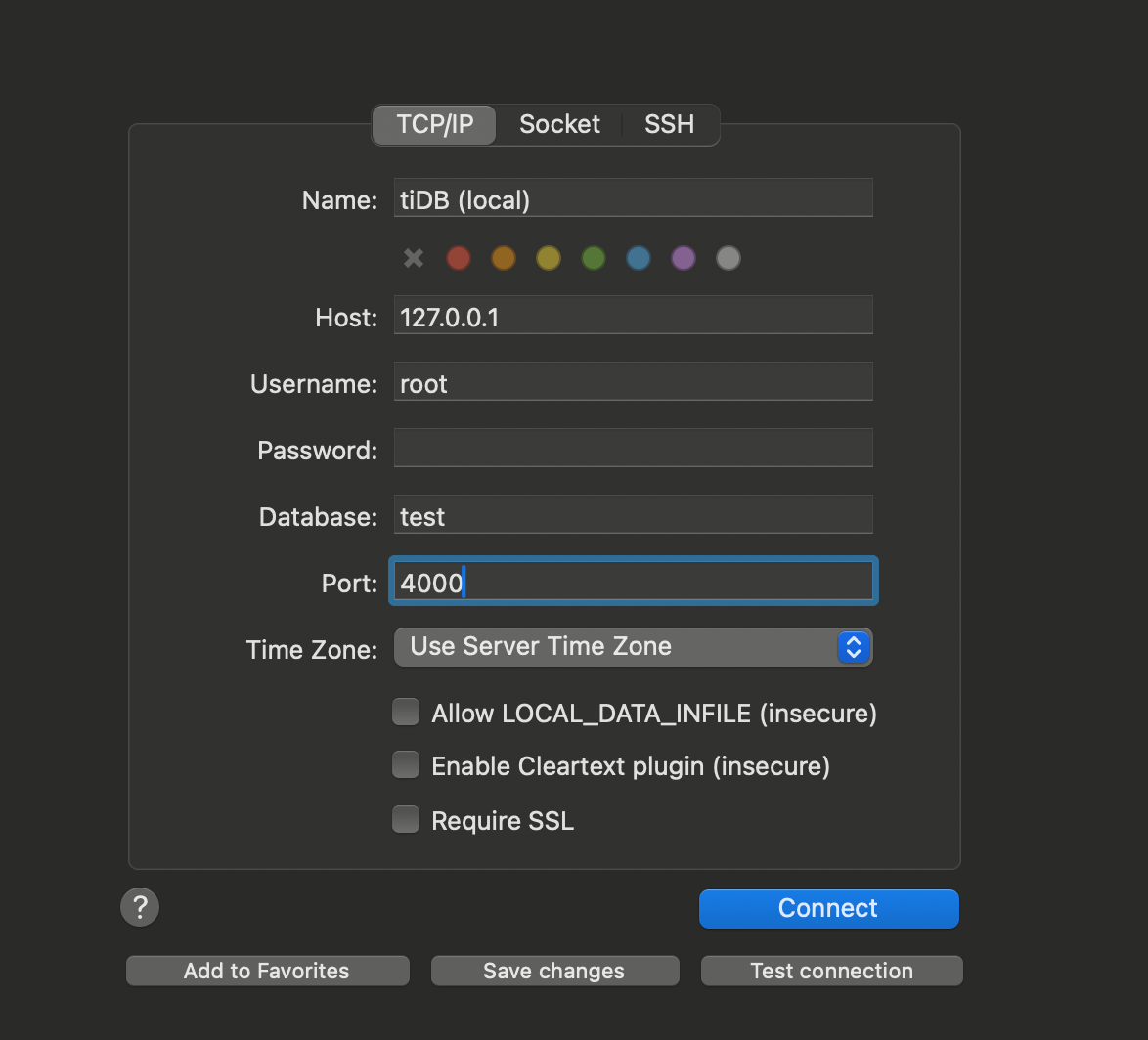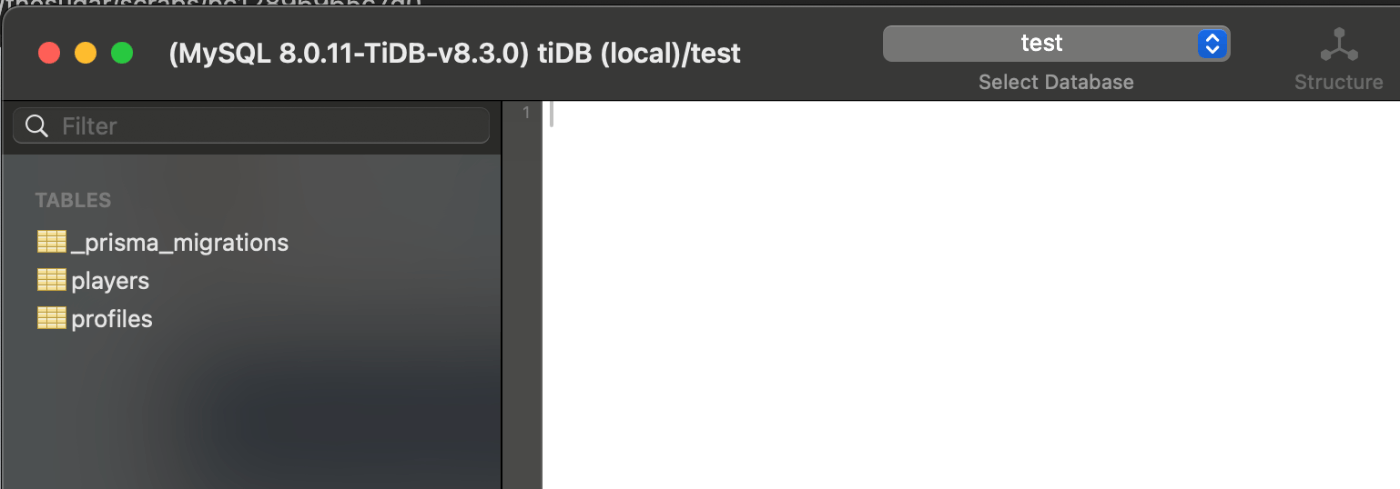Open17
TiDB, Prisma 試す
# tiup をダウンロードしてインストール
curl --proto '=https' --tlsv1.2 -sSf https://tiup-mirrors.pingcap.com/install.sh | sh
source /Users/thesugar/.zshrc
tiup playground
-
http://127.0.0.1:9090 で TiDB の Prometheus ダッシュボードにアクセスする。
-
http://127.0.0.1:2379/ でダッシュボードのTiDBダッシュボードにアクセスする。デフォルトのユーザー名はrootで、パスワードは空。
-
http://127.0.0.1:3000 から TiDB の Grafana ダッシュボードにアクセスする。デフォルトのユーザー名とパスワードはどちらもadmin。
- テストデプロイ後のクラスタのクリーンアップ
- Ctrl + C
- それでサービスが停止したら
tiup clean --all
次にこれ
Prisma で TiDB に接続する
git clone https://github.com/tidb-samples/tidb-nodejs-prisma-quickstart.git
cd tidb-nodejs-prisma-quickstart
yarn
続いて「Step 3: Provide connection Parameters」。
ローカルは TiDB Self-Managed で。
cp .env.example .env
ローカルの場合は以下かな
DATABASE_URL=mysql://root:@127.0.0.1:4000/test
(11/24追記)
mysql://root@localhost:4000/test は .env.example にすでに書いてあった。⬆️ は .env.example の例を見て書いたんだっけ? db名が test とわかったのは .env.example を見たから?他にどこで設定しているのか要確認。
続いて、prisma/schema.prisma 内でコネクションプロバイダーとして mysql を設定、コネクション URL として env("DATABASE_URL") を使うよう記述。
(サンプルコードの中にあらかじめ記述されているが)
generator client {
provider = "prisma-client-js"
}
datasource db {
provider = "mysql"
url = env("DATABASE_URL")
}
いまさらながら、local の DB に対しては以下で接続できる。(tiup playground している状態)

以下コマンドにより schema.prisma に定義されたデータモデルにより DB を初期化する。
npx prisma migrate dev
その際のログは以下:
~/tidb-nodejs-prisma-quickstart thesugar $ npx prisma migrate dev [main]
Environment variables loaded from .env
Prisma schema loaded from prisma/schema.prisma
Datasource "db": MySQL database "test" at "127.0.0.1:4000"
Applying migration `20230828153207_init`
The following migration(s) have been applied:
migrations/
└─ 20230828153207_init/
└─ migration.sql
Your database is now in sync with your schema.
✔ Generated Prisma Client (v5.22.0) to ./node_modules/@prisma/client in 72ms
DB を確認すると以下のテーブルが作成されている。

あとは普通にコードを書くだけっぽい。
⬇️ schema.prisma
// Define a Player model, which represents the `players` table in the database.
model Player {
id Int @id @default(autoincrement())
name String @unique(map: "uk_player_on_name") @db.VarChar(50)
coins Decimal @default(0)
goods Int @default(0)
createdAt DateTime @default(now()) @map("created_at")
profile Profile?
@@map("players")
}
// Define a Profile model, which represents the `profiles` table in the database.
model Profile {
playerId Int @id @map("player_id")
biography String @db.Text
// Define a 1:1 relation between the `Player` and `Profile` models with Foreign Key constraints.
player Player @relation(fields: [playerId], references: [id], onDelete: Cascade, map: "fk_profile_on_player_id")
@@map("profiles")
}
⬇️CRUD
// Step 1. Import the `@prisma/client` package, which is generated by `npx prisma generate` command.
import {Player, PrismaClient} from '@prisma/client';
/**
* 🚪Main function.
*/
async function main(): Promise<void> {
// Step 2. Create a new PrismaClient instance.
const prisma = new PrismaClient();
try {
// Step 3. Use Prisma Client to perform some CRUD operations.
const version = await getTiDBVersion(prisma);
console.log(`🔌 Connected to TiDB cluster! (TiDB version: ${version})`);
const newPlayer = await createPlayer(prisma, 'Alice',100, 100);
console.log(`🆕 Created a new player with ID ${newPlayer.id}.`);
const player = await getPlayerByID(prisma, newPlayer.id);
if (!player) {
throw new Error(`Cannot find player with ID ${newPlayer.id}.`);
}
console.log(`ℹ️ Got Player ${player.id}: Player { id: ${player.id}, coins: ${player.coins}, goods: ${player.goods} }`);
const updatedPlayer = await updatePlayer(prisma, player.id, 50, 50);
console.log(`🔢 Added 50 coins and 50 goods to player ${player.id}, now player ${updatedPlayer.id} has ${updatedPlayer.coins} coins and ${updatedPlayer.goods} goods.`);
const deletedPlayer = await deletePlayerByID(prisma, player.id);
console.log(`🚮 Player ${deletedPlayer.id} has been deleted.`);
} finally {
// Step 4. Disconnect Prisma Client.
await prisma.$disconnect();
}
}
void main();
/**
* Get TiDB version.
*/
async function getTiDBVersion(prisma: PrismaClient): Promise<string> {
const rows = await prisma.$queryRaw<{ version: string }[]>`SELECT version() AS version;`;
return rows[0].version;
}
/**
* 🆕 CREATE a new player.
*/
async function createPlayer(prisma: PrismaClient, name: string, coins: number, goods: number): Promise<Player> {
return prisma.player.create({
data: {
name,
coins,
goods,
createdAt: new Date(),
}
});
}
/**
* ℹ️ READ player information by ID.
*/
async function getPlayerByID(prisma: PrismaClient, id: number): Promise<Player | null> {
return prisma.player.findUnique({
where: {
id,
}
});
}
/**
* 🔢 UPDATE player information by ID.
*/
async function updatePlayer(prisma: PrismaClient, id: number, incCoins: number, incGoods: number): Promise<Player> {
return prisma.player.update({
where: {
id,
},
data: {
coins: {
increment: incCoins,
},
goods: {
increment: incGoods,
},
}
});
}
/**
* 🚮 DELETE player information by ID.
*/
async function deletePlayerByID(prisma: PrismaClient, id: number): Promise<Player> {
return prisma.player.delete({
where: {
id,
}
});
}



